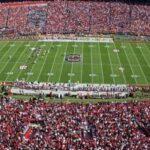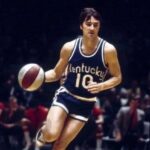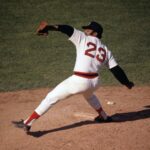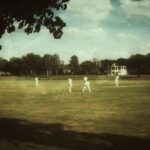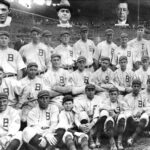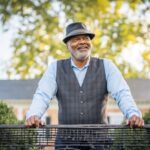Curling’s Southern Gentleman
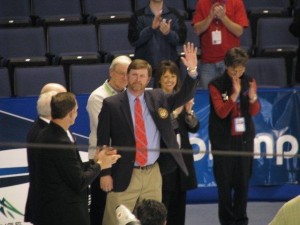
South Carolina's Beau Welling provides the U.S. Curling Association with ideas from someone from a non-traditional curling background.
Given that the sport of curling was invented in Scotland and perfected in Canada, you might be surprised to know that one of the biggest fans and advocates for the game is a golf course designer from South Carolina. Yet, when the Olympics start later this week Beau Welling will take his place among representatives from more typical winter sports locales as a board member of the Unites State Curling Association.
That someone with no background in the sport could become a decision maker at the national level illustrates the desire by the leadership within American curling to grow the popularity of the sport with a non-traditional fan base across the country.
Welling’s road to Vancouver is an interesting tale that started in 1988 when curling was a demonstration sport at the Calgary Olympics.
“I remember briefly watching it in 1988 with the rocks and brooms and thinking it was one of the most ridiculous sports I had ever seen,” Welling recalled.
It wasn’t until 14 years later in 2002 when Welling’s compulsion with the sport started to be cultivated.
“I saw it on television in Salt Lake City and was inexplicably drawn to the sport,” Welling said. “One of the guys in our office was from Canada and knew the sport, so I would come in every day asking him questions.”
By the time of the 2006 Winter Olympics in Turin, curling was a ratings bonanza for NBC and Welling couldn’t get enough of it.
Just weeks after the 2006 Olympics, the US National Championships were being held in Bemidji, Minnesota and for some odd reason Welling felt that he should be there. Unfortunately, he was scheduled to be in Europe on business at the same time.
In a moment that would have lasting implications, Welling’s trip was cancelled at the last second leaving him an unexpected free week and feeling like fate was sending him to Bemidji.
“When my trip was cancelled I felt like it was a sign that I was supposed to go to Bemidji,” Welling said.
Thanks to his secretary, Grace Bishop, Welling had tickets and unbeknown to him was the talk of the town.
Which Winter Olympic Sport is Your Favorite to Watch on TV?
- Curling (58%, 51 Votes)
- Hockey (15%, 13 Votes)
- Ski Jumping (8%, 7 Votes)
- Figure Skating (7%, 6 Votes)
- Downhill Skiing (6%, 5 Votes)
- Snowboarding (6%, 5 Votes)
- Bobsledding (1%, 1 Votes)
- Speed Skating (0%, 0 Votes)
Total Voters: 88
Bemidji is near the Headwaters of the Mississippi, is the home of mythical legend Paul Bunyan and is literally a different world from Welling’s hometown of Greenville, South Carolina.
“When I got there it was literally like the North Pole,” Welling recalled.
But it didn’t take long for Welling to feel at home.
On his first morning in town he went down to the hotel breakfast bar and the only other person there was Pete Fenson, skip of the men’s rink that won the first-ever U.S. medal in curling, a bronze at the 2006 Olympics.
“I was like a kid in a candy story,” Welling recalled. “I’ve met lots of famous golfers, but I was really excited and nervous to meet one of my curling heroes.”
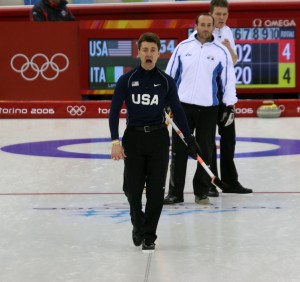
Meeting Olympic medalist Pete Fenson was a thrill for curling's Southern gentleman.
Welling introduced himself to Fenson and was surprised at the response. As it turns out, the prospect of having a businessman from the South coming to Bemidji had been a favorite topic among the locals and Fenson was as excited to meet Welling as Welling was to meet the Olympic medal winner.
He ended up staying in Bemidji for nine days and became completely immersed in the sport.
“I kept meeting person after person and it was really amazing,” Welling said. “It is a community of people with a great camaraderie and to be accepted was very special.”
The trip included Welling’s first experience trying the sport. He instantly realized that while it may appear on television to be a sport of grace and technique, it is also physically demanding thanks to the 42 pound stones.
“I was shocked at how difficult it was,” Welling said. “I had no idea where it was going.
“The physicality is something you don’t realize watching on television. After 20 stones I could barely walk.”
When asked about his curling prowess Welling is quick to say that he has definitely improved, but credits having Olympic caliber instructors for any advances in his performance.
“It is like having Phil Mickelson and Tiger Woods teaching you how to play golf,” Welling said.
During his time in Bemidji, Welling began talking with officials within the sport about ways to improve the profile of curling the United States. The mission of the USCA is to grow the sport in the United States and to win Olympic medals.
Several months after his trip, Welling received a call from USCA President Georgia West and after a long discussion about how the sport could move forward, he was surprised to receive an invitation to become a member of the USCA Board of Directors as their representative from a non-traditional background.
Welling says that he now designs golf courses to support his curling habit.
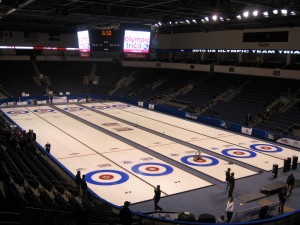
The 2009 U.S. Curling Nationals in Colorado marked the first time the event had been held in an arena.
He has been involved in a number of innovations within the USCA, including an attempt to elevate curling to a spectator sport in the United States. The 2009 U.S. Championships in Colorado included coverage from NBC Universal and marked the first time the event had been held in an arena.
One challenge that continues to face the sport of curling is the perception by many that it is just a winter version of shuffleboard.
Welling cringes at that notion and is quick to point out the similarities to three other sports or games.
He believes that the similarities between curling and golf are what ultimately drew him to the sport. Both originated in Scotland and are built around camaraderie, integrity and spirit. Both sports also rely on a combination of physical and mental prowess.
The scoring for curling is similar to that of the game of bocce.
Welling also sees similarities with chess as there is a tremendous amount of strategic thinking needed to in the sport. It is often referred to as “chess on ice.”
“You have to always be thinking about the next move,” Welling said.
In addition, the fact that it is played on ice brings with it the same need for physical balance and the ability to move on the ice that is required for other ice sports.
This interesting combination has made curling one of the sports to watch in the Olympics. It is one of the few sports that has seen its ratings increase in recent Olympics and is slated for significant airtime in Vancouver.
Once considered a niche sport, curling is now becoming more mainstream, something Welling ultimately attributes to its “everyman” quality as a sport that can be played by everyone from youngsters through older adults.
“It is a lifetime sport where three or four generations can play together and have a great family experience,” Welling said.
Curling will be featured on an episode of The Simpsons that is scheduled to air next Sunday, February 14th. It has also attracted a number of celebrities who, like Welling, have been inexplicably drawn to the sport.
Country singer Toby Keith and his band have participated in curling. San Francisco 49ers Pro Bowl tight end Vernon Davis has also become intrigued by curling and will serve as the Honorary Captain for the U.S. Curling team in Vancouver.
Welling believes that one of the keys to long-term success for curling in the United States is for curling clubs to continue sprouting up across the country.
There are now clubs in places such as California, Texas and North Carolina. While there is currently no club in Welling’s home state of South Carolina, he believes it will happen someday.
In fact, he spearheaded a joint resolution of the South Carolina legislature to promote curling as an official Winter Olympic sport of the State of South Carolina and to appoint representatives to investigate the designation of curling as an official Olympic sport for South Carolina.
It might be a while before someone from South Carolina is competing in curling at the Olympics, but thanks to Beau Welling, South Carolina is playing a role in shaping the future of curling in the United States.

